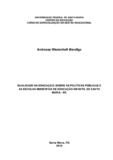| dc.contributor.advisor | Segat, Taciana Camera | |
| dc.creator | Marafiga, Andressa Wiedenhoft | |
| dc.date.accessioned | 2018-02-26T12:56:15Z | |
| dc.date.available | 2018-02-26T12:56:15Z | |
| dc.date.issued | 2016-02-18 | |
| dc.date.submitted | 2016 | |
| dc.identifier.uri | http://repositorio.ufsm.br/handle/1/12532 | |
| dc.description | Monografia (especialização) - Universidade Federal de Santa Maria, Centro de Educação, Curso de Especialização em Gestão Educacional, RS, 2016. | por |
| dc.description.abstract | Thinking about Early Childhood Education is to comprehend that we are before small children with opinions, desires, expectations and rights. These children have the right to early childhood school institution of quality, which ensures his well-being, strengthening its development to the maximum. From this understanding is that emerges the problematic for the monograph of the Specialization Course in School Management (UFSM), that is: In which way the policies that treat of quality in Early Childhood Education are being comprehended and implemented in two schools for the early childhood? The methodology of research characterizes itself as qualitative, because it seeks to comprehend the element to be researched, analyze and collect data for trying to understand them. In this way, the first phase consisted of delimiting the unit that constituted the case to be researched. The second phase was the data collection, for this stage we performed the delivery of questionnaires for two EMEIS (Escola Municipal de Educação Infantil – Municipal School of Early Childhood Education), these were directed one to the teachers and the other to the directive team. The third step is the interpretation of data obtained and finally we have the writing of the monograph. Throughout this work, it will be discoursed about the relation of the public policies and the understanding of how the school professionals comprehend and live the implementation of these policies. I reflect about some questions referring to the criteria minimally basic for having quality in the institutions of early childhood, as well as some fundamental rights of children in school scope, as for example, the right of playing. Finally, facing this study, I bring some considerations related to the lack of investment of the governments and some changes that need to be performed
In the EMEIS from suggestions pointed by those surveyed. One of these changes is the physical structure of the EMEIS. | eng |
| dc.language | por | por |
| dc.publisher | Universidade Federal de Santa Maria | por |
| dc.rights | Acesso Aberto | por |
| dc.rights | Attribution-NonCommercial-NoDerivatives 4.0 International | * |
| dc.rights.uri | http://creativecommons.org/licenses/by-nc-nd/4.0/ | * |
| dc.subject | Educação infantil | por |
| dc.subject | Políticas públicas | por |
| dc.subject | Gestão escolar | por |
| dc.subject | Qualidade | por |
| dc.subject | Direitos das crianças | por |
| dc.subject | Early childhood education | eng |
| dc.subject | Public policies | eng |
| dc.subject | School management | eng |
| dc.subject | Quality | eng |
| dc.subject | Rights of the children | eng |
| dc.title | Qualidade na educação: sobre as políticas públicas e as escolas municipais de educação infantil de Santa Maria - RS | por |
| dc.title.alternative | Quality in education: about the public policies and the municipal schools of early childhood education of Santa Maria - RS | eng |
| dc.type | Trabalho de Conclusão de Curso de Especialização | por |
| dc.degree.local | Santa Maria, RS, Brasil | por |
| dc.degree.specialization | Gestão Educacional | por |
| dc.description.resumo | Pensar na Educação Infantil é compreender que estamos diante de crianças pequenas com opiniões, desejos, expectativas e direitos. Essas crianças tem o direito a uma instituição escolar infantil de qualidade, que zele pelo seu bem estar, potencializando seu desenvolvimento ao máximo. A partir desse entendimento, é que surge a problemática para a monografia do Curso de Especialização em Gestão Educacional (UFSM), sendo: De que maneira as políticas que tratam de qualidade na Educação Infantil vem sendo compreendidas e implementadas em duas escolas para a infância? A metodologia da pesquisa caracteriza-se como qualitativa, pois busca observar o elemento a ser pesquisado, analisar e coletar dados para tentar entendê-los. Deste modo, a primeira fase consistiu em delimitar a unidade que constituiu o caso a ser pesquisado. A segunda fase foi à coleta de dados, para esta etapa realizamos a entrega de questionários para duas EMEIS (Escola Municipal de Educação Infantil), esses eram dirigidos um aos professores e outro a equipe diretiva. A terceira etapa é a interpretação dos dados obtidos e por último tem-se a escrita da monografia. Ao longo deste trabalho será discorrido sobre as relações das políticas públicas e o entendimento de como os profissionais da escola compreendem e vivem a implementação destas políticas. Reflito sobre alguns questionamentos referentes aos critérios minimamente básicos para se ter qualidade nas instituições de primeira infância, como também alguns direitos fundamentais das crianças no âmbito escolar, como por exemplo, o direito a brincadeira. Por fim, diante deste estudo, trago algumas considerações relacionadas à falta de investimento dos governos e algumas mudanças que precisam ser realizadas nas EMEIS a partir de sugestões apontados pelos pesquisados. Uma destas mudanças é a estrutura física, das EMEIS. | por |
| dc.publisher.country | Brasil | por |
| dc.publisher.initials | UFSM | por |
| dc.subject.cnpq | CNPQ::CIENCIAS HUMANAS::EDUCACAO | por |
| dc.publisher.unidade | Centro de Educação | por |



